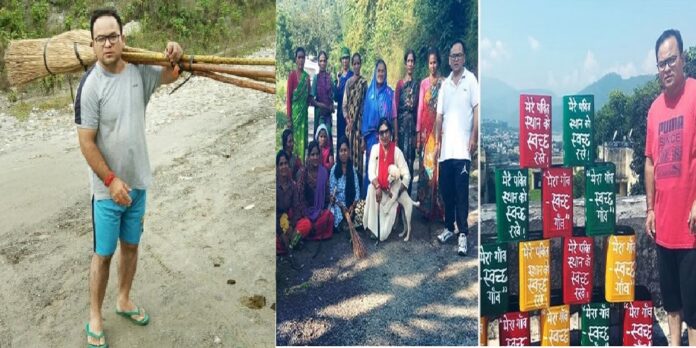(News Trust of India); In the tranquil village of Devli Bagad situated in Chamoli District, the revelation of the devastating impacts of dispersed waste came upon Virendra Singh Negi, a diligent farmer. His epiphany happened through his involvement in the ‘Mera Gaon Swachh Gaon’ campaign, a transformative movement spreading through the villages of Garhwal.
Back in 2014, on the historic anniversary of Mahatma Gandhi’s Birthday, Prime Minister Narendra Modi, six months into his mandate, unfurled the ‘Swachh Bharat Mission,’ envisioning a spotless India, free from the shackles of trash. Yet, the landscape stays mostly intact, as the people remains naïve to the risks of litter and refuse consuming the nation.
Enter Bhuwan Rawat, a 32-year-old engineer, who, disillusioned with urban aspirations, contemplates a return to his roots, equipped with a goal. In 2017, he kindled the flame of transformation with the launch of ‘Mera Gaon Swachh Gaon.’ His ethos: dependence on self rather than on governmental intervention; a resounding call to defend national duty above all.
Bhuwan’s enlightenment came amid the calm milieu of the Dhari Devi Temple in Srinagar, Pauri District. Witnessing followers destroy the sacredness with litter, he pondered the broader consequences of such negligence. Thus began his path of transformation.
Recycling waste oil canisters into vibrant dustbins, Bhuwan lead a community effort. Initially met with apathy, his determination bore reward as the temple premises changed into an oasis of cleanliness. The ripple effect cascaded, creating a yearning for change within the public.
Buoyed by the win at Dhari Devi Temple, Bhuwan set his sights on bigger horizons, going on a journey to purify the hinterlands. Armed with a broom and irrepressible spirit, he roamed the streets of Kandara, spreading the gospel of sanitation. His acts spoke volumes, motivating people into action.
Through tireless agitation and grassroots mobilization, ‘Mera Gaon Swachh Gaon’ infiltrated the fabric of Uttarakhand. From the beautiful slopes of Chamoli to the picturesque hamlets of Pauri, the siren demand for cleanliness reverberated. Villages earlier disfigured by neglect now stood as bastions of sanitation.
The ethos of the movement surpassed mere cleanliness; it encapsulated a collective awakening. Villagers, formerly indifferent, now rallied every fortnight, unified in their fight for a cleaner tomorrow. Lime-laden walkways bore tribute to their combined efforts, a testament to local pride.
In the heart of Kandara, Pauri, and beyond, the movement blossomed, pushed by the collective resolve of the inhabitants. ‘Mera Gaon Swachh Gaon’ became synonymous with grassroots empowerment, a light of hope among societal lethargy.
As the campaign gained speed, Bhuwan’s resourcefulness knew no limitations. Leveraging social gatherings like weddings and processions, he diffused awareness, one trashcan at a time. His message resonated, sparking a flicker of conscience in the hearts of many.
Beyond mere campaigning, Bhuwan’s crusade expanded to the sphere of education. Recognizing the nexus between sanitation and learning, he championed volunteerism in rural schools, bridging the gap caused by state indifference.
Acknowledged by luminaries like Central Minister Uma Bharti and Education Minister Dr. Dhan Singh Rawat, Bhuwan stood as a model of grassroots leadership. His experience typified the transformational power of individual action, a tribute to the adage: “Be the change you wish to see in the world.”


